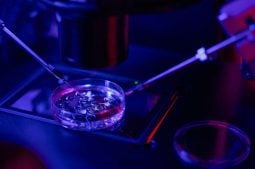
If you’re pregnant, you have been through puberty. You may already know about the effects of hormonal changes on your body and your mood. But, as with puberty, these changes and fluctuations are essential for the process of forming a new life. So, in the bigger picture, they are good for you and your baby.
In this IVI article, we aim to help you understand early pregnancy hormones. How do they support your developing baby? How do they help to prepare your body for the eventual birth? It all starts with ovulation. We’re going to explain what happens to estrogen levels after ovulation if you’re pregnant. What happens to progesterone levels after ovulation if you’re pregnant, as well as some of the other changes you can expect. This will help you to develop a mental picture of a hormone chart for the early days of your pregnancy.
What are the main pregnancy hormones?
Progesterone and estrogen and are the two main hormones that regulate your menstrual cycle. They are two of the most important hormones involved in your pregnancy. Your body is already familiar with these hormones, although not necessarily in the amounts present during pregnancy. They are joined early in the process by a new hormone, Human chorionic gonadotropin (hCG). It is known as the pregnancy hormone because it is almost exclusively produced after conception has taken place. Let’s look more closely at these early pregnancy hormones.
Progesterone
Progesterone has already played an important part in your pregnancy. It has prepared your uterus lining each month for the possible eventuality of a fertilized egg to implant. When this happens, progesterone levels, instead of declining as they would if you had not conceived, remain elevated not only in the first trimester but throughout your pregnancy. At this early stage, the progesterone you need in the first few weeks of pregnancy is produced by the corpus luteum. This is a temporary gland which develops from the egg follicle after fertilization. Its functions in early pregnancy, in addition to preparing the womb lining for implantation, are to increase blood flow to the womb. It also stimulates the womb to create nutrients to support the embryo and helps to establish the placenta.
In addition to its roles in supporting your pregnancy, higher levels of progesterone can cause some unwanted ‘side effects’. Progesterone’s action as a muscle relaxant helps to prevent your uterus from contracting until the appropriate time. However this same action can also cause constipation, as it slows down the working of the digestive tract. It is also associated, as many women know from their menstrual cycle, with tension and mood swings. Since levels remain high throughout pregnancy, it can have the same effect. For more about progesterone, see our article What is the Role of Progesterone?
Estrogen
In the meantime, estrogen is maintaining the vital uterus lining while also helping to regulate the correct levels of progesterone. It promotes an increase in blood flow which is important in nourishing the growing fetus and triggering the development of its organs.
The impact on you and your daily life, however, may not be such obviously good news. The increased blood flow causes the tender and aching breasts so familiar in early pregnancy. It can also lead to the stuffy nose feeling experienced by many women. In addition, the increased volume of blood gives the kidneys extra work to do in removing extra fluids. This, combined with pressure on your bladder from your growing uterus, can mean a frequent and urgent need to urinate.
Happily, the legendary ‘bloom’ of early pregnancy is also caused by the increased blood flow, bringing a healthy pregnancy glow to your skin.
Human chorionic gonadotropin (hCG)
Human chorionic gonadotropin is detectable in your urine and bloodstream within about seven to nine days after conception. Therefore, it forms the chemical basis of home pregnancy tests. It is produced by the cells that surround the developing embryo. These will soon form the placenta. Levels in the bloodstream increase steadily in the early weeks of pregnancy. They double every two to three days as development and growth of both the fetus and the placenta continue.
The role of hCG is to encourage production of the optimum levels of progesterone in the early weeks to support the pregnancy. Levels peak at around six to eight weeks and then plateau. After the placenta is established, it takes over the role of progesterone production. The amount of hCG in the bloodstream doubles every two to three days as development of the embryo and placenta continue, and levels peak at around six to eight weeks of pregnancy. Following this peak, levels of human chorionic gonadotropin plateau.
Increasing levels of hCG could be the cause of so-called ‘morning sickness’ although medical practitioners are not certain. If this is the case, it would explain why for many women, nausea is experienced only in the early weeks, as levels of the hormone multiply rapidly, and tend to recede after hCG levels have reached a plateau.
Other essential early pregnancy hormones
There’s a whole cocktail of other natural pregnancy hormones that will affect the baby’s development and wellbeing in the first trimester of pregnancy, as well as having an impact on how you are feeling. These include:
- Prolactin, a hormone made by the pituitary gland, is there to encourage the growth of your breast tissue and an increase in milk-producing glands in readiness for breastfeeding. It can also cause extra hair growth such as on the face and belly, but this usually disappears after the baby is born.
- Relaxin, a hormone whose main purpose is to relax the muscles and joints to accommodate the growing baby, is present throughout pregnancy. In the early weeks, it can cause back pain and discomfort, even though the growing uterus is not yet large enough to have an impact on your posture.
Other hormones, such as oxytocin, insulin, and cortisol, will come to play a more important role in the later stages of pregnancy. They are concerned with maturation and final development of the fetus, and in preparing your body both for the birth itself and for breastfeeding. That’s for later. For now, enjoy your early pregnancy glow, and if you have morning sickness, remember it’s most likely to fade away to a distant memory in just a few weeks!
If you want to know more about early pregnancy, take a look at our articles on Implantation Cramping: Everything you Need to Know and Back Pain During Pregnancy: Causes and Treatments.
Our team will be happy to solve you any doubt you have, or book an appointment with one of our doctors. Contact us by phoning or fulfilling our web formular, so we can call you back.





Comments are closed here.